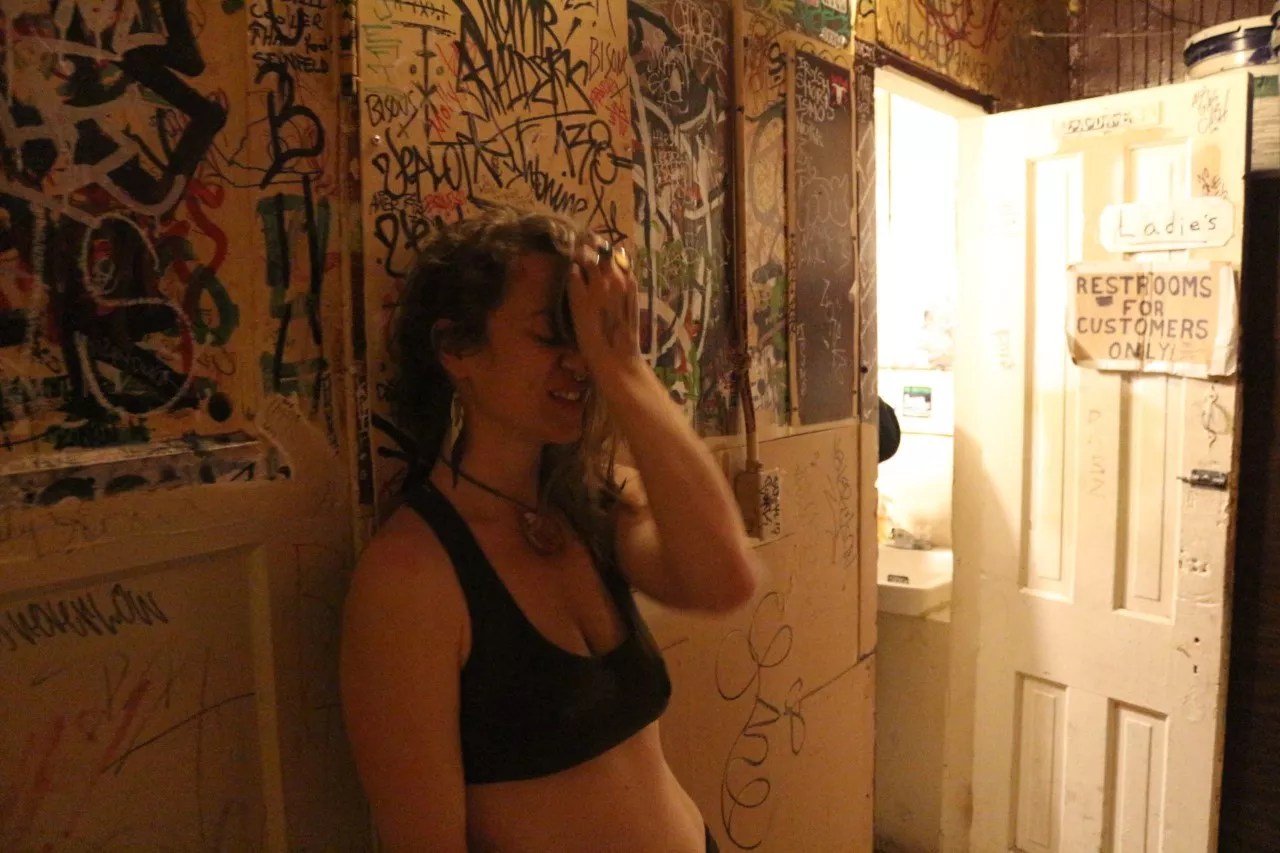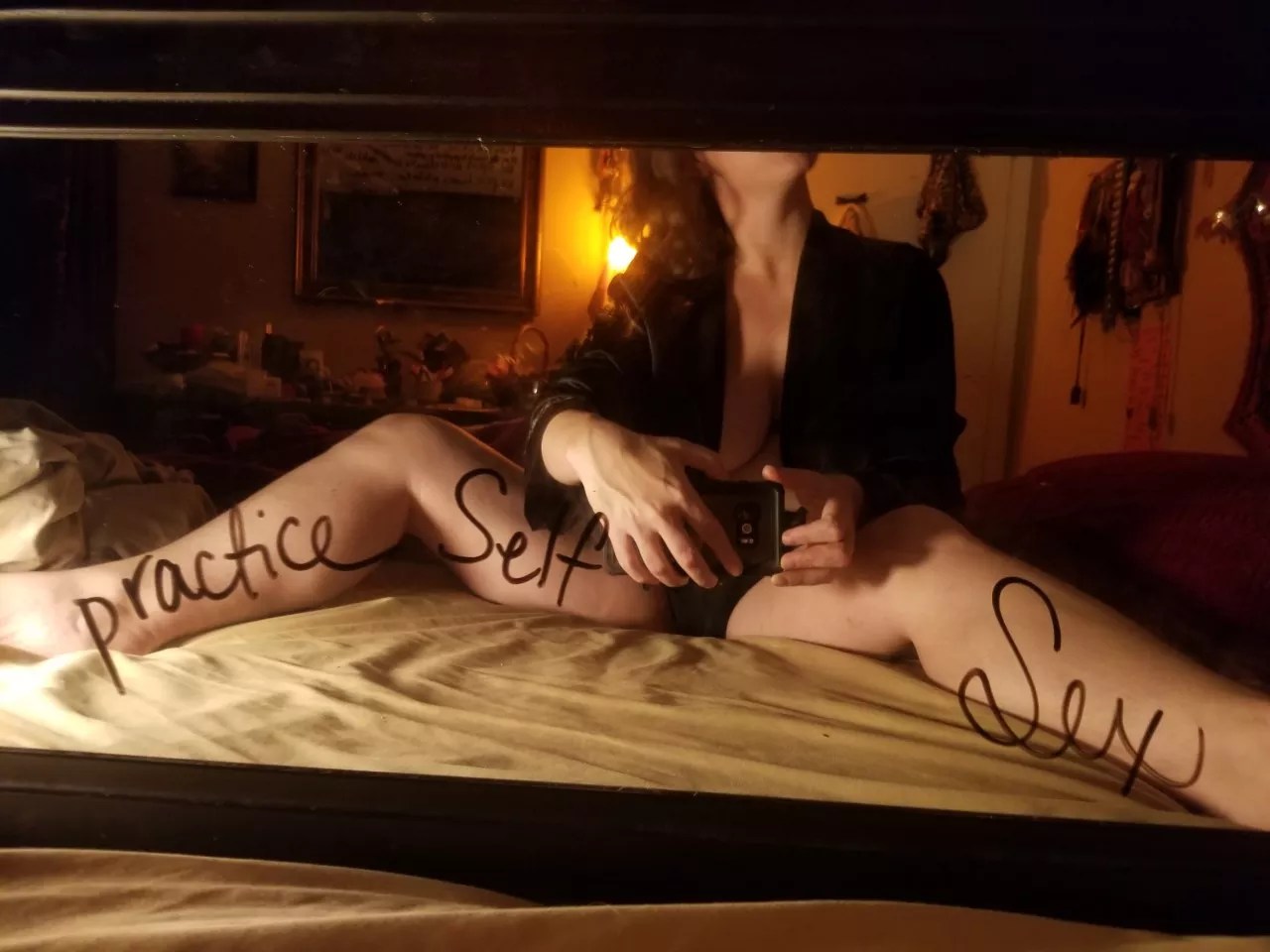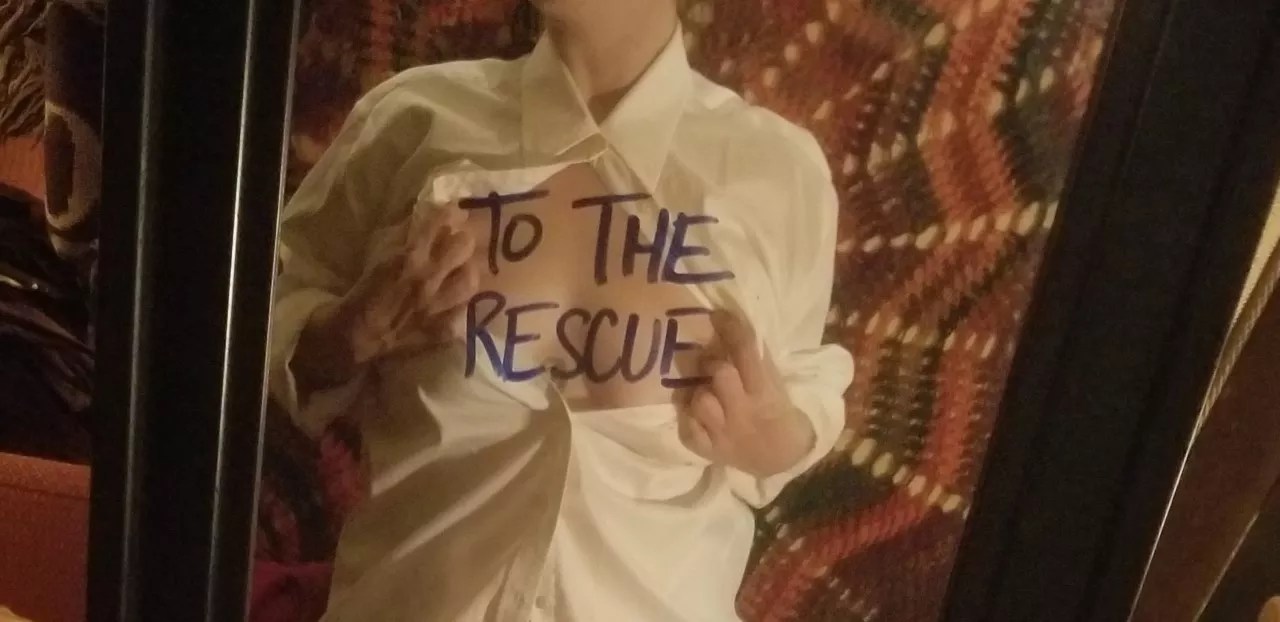
Stina French

Audio By Carbonatix
The name sister rainbow scream is purposely not capitalized – both as a tip of the poetic hat to e.e. cummings and to remind Stina French that none of what she’s doing is about her. So, no, it isn’t her real name; her not-so-secret day job is as a teacher of composition and literature at Red Rocks Community College. But when the moon is full (and when she just plain feels like it), she transforms into sister rainbow scream, specialist in “body-based writing,” leader of monthly generative-writing workshops, and host and founder of the monthly open-mic reading series Listen to Your Skin, which she describes on her website as “text-y sex church.”
French took on the sister rainbow scream moniker in 2016, when she “first dreamed [her] business into being,” she says. She wanted something that signified those things she cared about deeply: “sister” for family and connection; “rainbow” for both its “cliché after-the-rain” and queerness connotations; and “scream” for letting it – whatever it is – up and out, especially if it’s loud.
We caught up with French to talk about her alter ego, her work on the juxtaposition of sex, writing and the body, and talking about sex in this era of social distancing.
Westword: You’re the founder of Listen to Your Skin, a monthly erotic reading/open-mic series on Zoom. How did you come to start this project?
Stina French: As a way to survive the pandemic, I attended more Zoom literary events than anyone I know, and my networking with other writers intensified. I started to figure out what works and what doesn’t with this kind of event – you know, what makes it feel alive and embodied versus just talking heads. Hint: Trust participants to unmute themselves and clap! There’s nothing worse than a quiet reception to one’s work – unless your intent was to leave everyone speechless, I reckon.
Anyway, I still didn’t have the idea to do it until after I hosted an erotic-writing workshop in early January. Afterward, nobody wanted to leave, and folks asked if we could gather again. That’s the moment I realized I was positioned to create this kind of space.

Poetry tiles: the next big thing in shower decor.
Stina French
What in your background led you to create this series and its approach, specifically?
I grew up in the fundamentalist small-town South, being told not to “act smart,” and every message I got told me to shrink, be less than I am. I guess now my mission is to bring it all up and out. Especially the unsayable things. The things we make dirty by burying them. And to act smart as hell about doing so.
The name for the event came from an imaginary conversation I had with my dead mom, in a time I was experiencing a major depression, in which she told me to “listen to my skin.” One of the first serious poems I wrote after beginning to find my voice ended up using this line. I was in a hot tub staring at this bright-yellow wasp trap dangling in all this fresh falling winter snow. I remembered being attacked by a horde of them when I was a small girl. I’ve always had anxiety. Always felt like I was somewhere outside myself, looking for a way back in. In the poem, I say, “No one is coming to save you. No one is coming to put you back in.” It also says, “When it stings like that, when no one is there to stop the stinging, listen to your skin. Sing over the sting.” I guess collective gathering over shared expression is a kind of singing over the stings to me. A kind of singing we desperately need. The theme of my event may be sexual or erotic, but really, whether folks share fiction or memoir or essays or poetry, this is about listening to our bodies and writing from our bodies, then coming together and sharing what we heard.
I know that when I slow down and really listen, my art flows. This is no bombshell: We know this. We know that quieting the mind and being supremely present allows our unconscious to surface and attach to reality and show us what it’s likely been trying to say all the while.
Talk about the importance of vocalizing the subject of sex: Why is it important to talk about it openly, to write about it, to share it with friends and strangers?
As long as sex is some closeted, taboo topic, we will remain in the dark about what drives desire. Writing is one of the best ways we have to explore our thoughts and feelings, and when we use writing to explore our sexual selves, we increase our potential for pleasure. That’s because when we widen our erotic vocabulary by reading or writing sex, we find more ways to name what we want and what we don’t want. There are more ways to fuck than are dreamed of in our culture’s narrow pornography. We must dream them!
Words aren’t the whole of meaning; there are some things the body just knows, but with a way to say them, we become empowered. We know that traumatized people have trouble using their imagination. But we also know we can use play and fantasy, in safe spaces, to get the creative part of the brain moving again. And that’s what I really care about: flow. So many of us get so stuck. Stuck on our bodies and how they look. Stuck on whether this or that person finds us attractive. Stuck on something that happened that we still feel shame for. Shame especially interrupts pleasure. They say shame can’t survive in the light. So we can write our way to healing by sharing what we write. We create ourselves with every line we throw out ahead. We write ourselves into being, whether we’re composing text or not.
In my own writing, I am working to claim myself, to inhabit myself. I believe doing so in front of my audience invites anyone else who feels dislocated back into themselves, too. That is the mission of this event, at its core, to promote presence and comfort with inhabiting one’s own skin, and to do that by encouraging folks to express themselves. That’s why we give out a different writing prompt each month, in the hopes that open-mic participants will write toward it.
Every time we start the event, we play the opening to Prince’s “Dearly Beloved,” because to me, this is very much that collective feeling of church. Church for the thoughtful, lit-loving hedonist.
In these pandemic times of isolation, do you think there’s a magnified need for sex and the examination of sex?
Oh, good gawd, yes! I chose the theme for the first LTYS by asking myself, “What is the aspect of sexuality that might be most ‘up’ for people right now?” Oh, yeah, self-sex, because so many of us are isolated. I was working very hard at this time to heal from heartbreak, to come back into myself and to reclaim my right to experience pleasure. I’d spent a very long time absent from my body – along with everybody else these days, I think. I had just had this ecstatic experience of entering myself, physically and spiritually, and I was writing about it…trying to get at the concept of surrender and self-forgiveness…and it just hit me. This is the theme for the first event. So I got myself feeling all sexy and got in front of a mirror and wrote “self sex” across my thighs, and thus the tradition of writing on the body in the event’s ads was born. As soon as I announced the event and saw the fast response it got, I knew I’d chosen the right theme.

The photo that helped launch January’s online open mic.
Stina French
January’s topic was masturbation, especially as it concerns the COVID era. What sense did you get from participants as to the effect of the pandemic on their sexual practices?
I couldn’t tell you if folks are masturbating more or less often, but what I did notice was that quarantine had increased people’s desire for touch, but the ongoing isolation and fear also made it feel dangerous to be touched. That edge between desire and fear is, of course, highly charged and erotic. I don’t think there was a dry…hmm, let me switch metaphors before I get us in trouble. The room was electric, with us speaking our profound, unrequited desire for touch. Dramatizing the self-touching we used in place of that other-touch. Feeling seen and heard in that shared experience of isolation was transformative. Another thread running through the pieces shared that night was a joyful one: folks rediscovering their bodies because of the increase in downtime. Folks valuing the relationship they have with their own sexuality, period, not as a replacement for other-touch. Folks speaking about how they hadn’t considered just how important their sexual relationship with themselves was until forced to sit with themselves this long.
Around the time of this event, I was starting to really lean into practice: singing practice, walking practice, reading practice – any regular, ritualized behavior I could latch onto to quiet my anxiety. Self-sex practice was one of the ways I invited myself back into my body, reminded myself that I have a right to feel pleasure.
February’s was Sexual Superheroes. Was there a consensus as to who’s the sexiest superhero? I hope that debate was part of the evening, because: awesome.
You know what? I’m going to disappoint you. We didn’t really focus on actual superheroes, and here’s why: That kind of thinking keeps us focused on someone else saving us. The consensus seemed to be in continuation from the self-sex event: We save ourselves. This theme was gloriously stated by Gayle Danley, our February feature, in her piece “Superheroes,” where she lists the real superheroes in her life, including herself: “I’m gonna stay right here on the ground, flying.”
But, hey, best believe if somebody had done a porn fanfic on Captain Marvel – who is quite clearly the most amazing superhero – I would have licked that juice right up.

And the theme for February, which sadly did not determine the sexiest superhero.
Stina French
How do you come up with topics on which to focus?
Honestly, sitting around and dreaming up these themes and having the eggs to reach out to various folks who have no reason to know my name is, like, the highlight of my life right now. Much more interesting than my day job. I sometimes follow my own art for themes, but usually I ask authors whose work I love if they’d like to feature, and then we work to determine a theme that isn’t too repetitive with recent themes that might fit their work.
Can you define erotica for us? Everyone’s definitions must be different, right? How do you reconcile different perspectives, from porny to passionate and beyond, in real time, in an open-mic setting?
Ha, this question, yes! You know, to be honest, I’m not interested in the difference between porn and erotica. I think the most graphic depictions can be absolutely intellectual and “highbrow,” and if you don’t believe me, go listen to January’s feature on our Facebook page. Jessica Lawson mixing masturbation with Irigaray and Borges: “I part my failure and thrum it…I part my failure and pretend its lips form a parenthesis around possibility.” I think the prettiest erotica can be completely lacking in literary merit and also completely unerotic. I can only define erotica by what I’m looking for it to do to me, and here’s what I want: I want erotic writing to make me see a new perspective on sex, because new perspectives turn me on. I want a mantra-like quality, because that turns me on, like the repeated chorus of a lover’s kiss in that one spot. I want graphic, raw and honest words that use metaphor in refreshing ways, because that also turns me on.
Does Zoom actually help people give in to the want to participate? I’d think the relative anonymity might be freeing for some. Or is anonymity the opposite of the point?
Oh, yes, definitely. The chat feature is amazing, especially, for increasing overall participation. Also, I think not having your whole body in a room has drawbacks we’re all aware of, but last month, a regular attendee wrote me early the day of the event and said she wanted to write but it just wasn’t coming. I gave her some ideas for how to jar it loose, and I swear within the hour, she’d written a poem – and that night, though it had been ten years since she’d read in front of people, she read it. I’m not sure with her level of nerves that she’d have done that in a room actually full of people.
I also have to say that virtual events are so much more inclusive of anyone who has chronic pain or mobility issues. It’s easier to take care of yourself during a virtual event. You can lie down if you want. You can go get a drink, walk around while listening. And the way it’s shrunk the world! Being able to attend an open mic and perform on the same stage as some of these accomplished writers? Amazing!
But, no, also, anonymity isn’t the point, because Zoom brings your face up close and personal. Because each person can be more present with the reactions buttons and the chat. We don’t feel anonymous, because we can clearly see each other’s names and pronouns. We can see what others like in our work when we type our favorite lines in the chat. I got this idea from a phenomenal event I attend sometimes on Friday nights –Nomadic Press‘s Virtual Open Mic, put on by a phenomenal poet Nazelah Jamison, one of my first models of what it means to create literary community with a higher purpose.
What’s the biggest misconception people have about writing and sex and forums like Listen to Your Skin?
I wouldn’t know what misconceptions people have about events like mine, but about writing and sex, I can speak. People think writing is some special skill they’re locked out of because of all the gatekeeping and canon worship that’s gone on. People think sex has to do with the person they’re having sex with, when it really has mostly to do with their own internal relationship to sex and their sexual history.
Where I grew up, the dominant religion was Southern Baptist. Their ideas of the “correct” roles of women and men, Original Sin, eternal damnation, the evil nature of non-procreative sex and the literal nature of Scripture are not just polarizing, they’re traumatizing. Their fixed position toward truth – that it’s unchanging and knowable by a select few who then deliver it to the rest of us, if we’re lucky – relates to canonical literature worship, and I have no stomach for either of them anymore. The last thing fundamentalist groups want is for us to listen to our skin and hear the truth in our bodies.
Find out more at sisterrainbowscream.com.